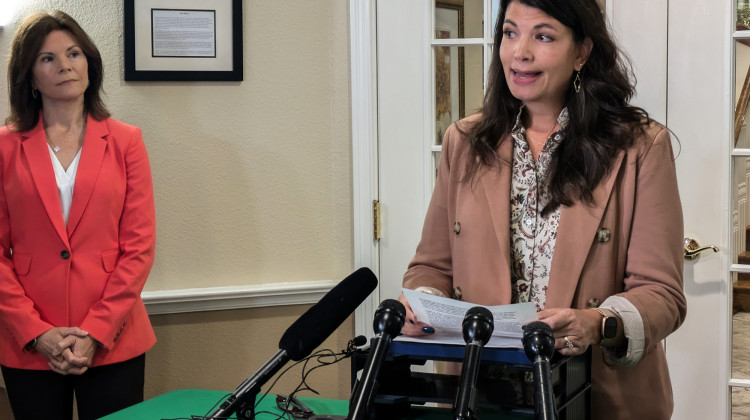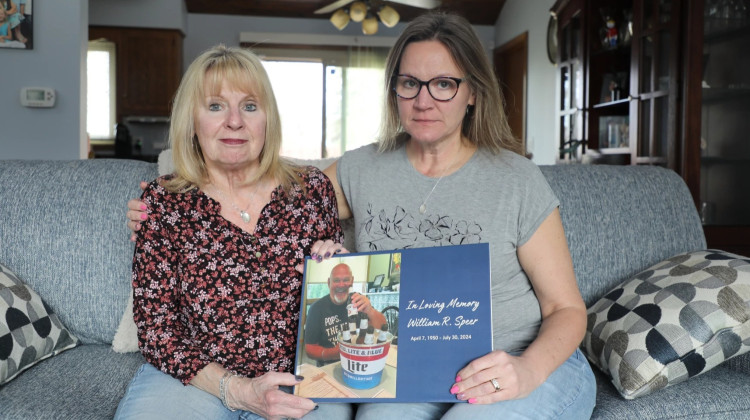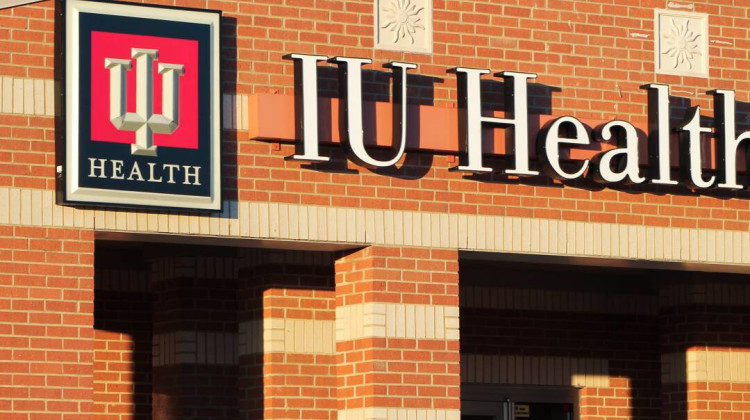
Jo Lynn Garing’s grandmother was placed on the waitlist for the Pathways waiver a couple of months after the Indiana Family and Social Services Administration implemented it. Garing said she spent months trying to figure out where her grandmother was on the waitlist and how FSSA determined who received an invitation.
Lauren Chapman / IPB NewsThe Indiana Family and Social Services Administration implemented a waitlist for certain Medicaid services more than six months ago — and advocates said it’s created a significant barrier to care for medically complex Hoosiers. There are more than 13,000 Hoosiers still waiting for home- and community-based services through Medicaid between two waivers.
Josephine Malone was one of those more than 13,000 Hoosiers. She died on Oct. 3, still waiting for services through Indiana’s Pathways waiver.
Her granddaughter, Jo Lynn Garing, said her grandmother was independent her entire life. She was a single mom who ran a tavern with her sister until she finally retired in 1991 – in her 70's. And she lived independently in her home in Peoria, Illinois, until she was 94.
“She was an adventurous, strong and deeply faithful person with a personality that lit up every room that she entered. She was a true Rosie the Riveter during World War II, where she worked as a foreman in a factory making lenses for Navy ships,” Garing said.
Malone turned 103 a few months before she was placed on a waitlist for the Pathways Waiver — which would allow her to remain in the assisted living facility she was already in, Bloom at Kessler in Indianapolis.
Malone had already spent down her savings, so her family would either have to pay for her care out-of-pocket or transition her to a nursing care facility. Garing said her family didn’t have the resources to pay for her care without support.
In addition to congestive heart failure, Malone also had dementia. Transitioning her to a nursing home could have had a negative effect on her health.
“I knew if we did have to move her, she would go through a really tough adjustment period again, where she didn't know where she was, why she was there, or why she wasn't with one of her family members,” Garing said.
However, the only reason Malone was able to remain at Bloom was because the organization agreed to provide care at a reduced rate through the end of the year in order to avoid transferring her and disrupting her care.
The organization did this, knowing they would not be reimbursed enough to cover the full cost of her care.
Malone was placed on the waitlist just a few months after FSSA implemented it. Garing said she spent months trying to figure out where her grandmother was on the waitlist and how FSSA determined who received an invitation.
FSSA said it cannot give people an estimated wait time because it depends on how many people are part of a priority category each month. Those who get “priority status” are individuals who are discharged from the hospital, transition from a nursing facility or transition from the CHOICE program.
Malone’s situation isn’t unique. Dan Kenyon, executive director of the Indiana Assisted Living Association, said he talks regularly with Hoosiers across the state with similar experiences.
Join the conversation and sign up for the Indiana Two-Way. Text "Indiana" to 765-275-1120. Your comments and questions in response to our weekly text help us find the answers you need on Medicaid and other statewide issues.
Advocates said FSSA shouldn’t have implemented a waitlist because it makes it difficult to connect people to services. They say the agency needs to quickly process the waitlist and look for ways to get rid of it altogether.
The FSSA implemented the waitlist in response to last year’s $1 billion forecasting error.
Rep. Carey Hamilton (D-Indianapolis) said there shouldn’t be a waitlist and the decision to implement one was made “behind closed doors.”
“One of the many frustrating points of the story is that we have not had a substantive policy conversation about how we fix the budget shortfall,” Hamilton said.
Hamilton said the state budget committee should work on a solution to address the issues caused by the waitlist. She also said people encountering issues should reach out to their lawmakers ahead of the 2025 legislative session.
She also said she was concerned that FSSA, the agency in charge of making these decisions, was also the agency accused of caving to “political pressure.”
In a “whistleblower” lawsuit, two former state officials alleged several Indiana hospital systems and managed care entities committed “tens, likely hundreds” of millions of dollars of Medicaid fraud.
The lawsuit said starting in late 2017, a senior executive at Indiana Medicaid “improperly directed the Program Integrity team to significantly curtail its efforts to utilize analysis and findings to recoup improper Medicaid overpayments” by the defendants. The lawsuit pointed to political pressure from lobbyists for the health insurers and the hospitals.
“The ironic reality of those two things is just wildly disappointing, and it points to a system where the fox is guarding the henhouse,” Hamilton said
Hamilton said anyone who encounters issues on the waitlist should reach out to their lawmakers. She suggests requesting a phone call with their state representative or senator to share their experiences ahead of the legislative session.
Abigail is our health reporter. Contact them at aruhman@wboi.org.
 DONATE
DONATE






 Support WFYI. We can't do it without you.
Support WFYI. We can't do it without you.